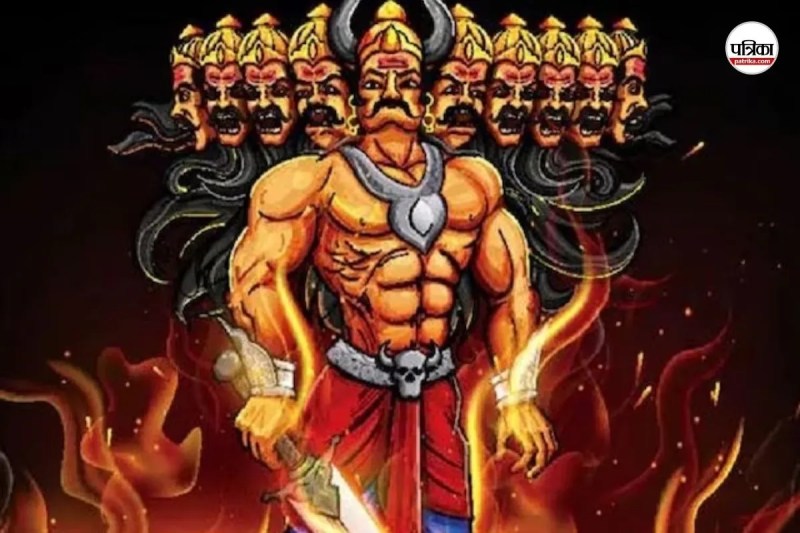
Ravana (Image: AI)
The auspicious festival of Vijayadashami, known as Dussehra, will be celebrated this year on October 2. Across the country, the victory of Lord Rama over Ravana is celebrated with great fanfare, where effigies of Ravana, Meghnada, and Kumbhakarna are burnt. This practice symbolises the victory of good over evil. However, a unique aspect of India's cultural diversity is seen in places where Ravana is not considered a villain but is revered as a scholar, a devotee of Shiva, and even a clan deity. Here, traditions of worship, mourning, or respect for Ravana persist instead of his effigy being burnt. Let's explore some of these prominent places.
Bisrakh village, located near Greater Noida, is considered the birthplace of Ravana. The Ramayana also mentions that Ravana's father, Sage Vishwamitra, had his ashram here. A Ravana temple exists here, where instead of burning Ravana's effigy on Dussehra, yajnas and peace pujas are performed. The villagers refer to Ravana as 'Mahabrahmin' and offer prayers for the peace of his soul throughout Navratri. It is believed that burning Ravana's effigy incurs a sin equivalent to the killing of a Brahmin.
The Baijnath Shiva temple in the Kangra district of Himachal Pradesh commemorates Ravana's devotion to Shiva. According to mythology, Ravana paused here to quench his thirst while carrying the Shiva Lingam from Mount Kailash, where the Lingam sank into the earth and revealed an Ardhanarishvara form. In honour of Ravana's devotion, no effigy of Ravana is burnt on Dussehra. Local belief holds that doing so would anger Lord Shiva. Some tales suggest that those who attempted it met untimely deaths.
The famous Kullu Dussehra in Himachal Pradesh is a unique festival that lasts for seven days, but there is no tradition of burning Ravana's effigy here. The festival focuses on the traditions of local deities, where Lord Rama is worshipped, but instead of burning Ravana, emphasis is placed on sacrifices and folk dances. This festival, declared a UNESCO cultural heritage, resonates with the cheers for deities rather than for the burning of Ravana.
The Dashanan Temple in the Shivala area of Kanpur is renowned for the worship of Ravana. Here, an idol of Ravana is installed alongside a Shiva Lingam, and the temple opens only on Dussehra. Devotees chant 'Jai Lankesh' and worship Ravana as a devotee of Shiva and a worshipper of Goddess Chhinnamasta. It is believed that applying oil to Ravana's navel bestows marital bliss and progeny.
In Ravangram, Vidisha district of Madhya Pradesh, Ravana is referred to as 'Ravana Baba'. Here, a 10-foot-long idol of Ravana in a reclining posture is worshipped. The villagers consider themselves descendants of Ravana and worship him on Dussehra. There is also a tradition of inviting Ravana on occasions like weddings.
In the tribal-dominated Gadchiroli region of Maharashtra, the Gond tribe considers Ravana a devotee of Shiva and a scholar. They rely on the Valmiki Ramayana rather than Tulsidas's Ramcharitmanas, where Ravana's character is portrayed with more nuance. On Dussehra, instead of burning Ravana's effigy, yajnas are performed to honour his devotion.
In the ancient village of Mandore, located in the Jodhpur district of Rajasthan, this festival takes on a different form. Here, Ravana is not seen as a symbol of evil but is worshipped as a son-in-law and a devotee of Shiva. On Dussehra, instead of burning Ravana's effigy, mourning is observed, as according to many local beliefs, Mandore is considered the maternal home of Ravana's wife, Mandodari.
According to some texts and local people, Mandsaur is considered the birthplace of Ravana's wife, Mandodari, due to which Ravana is honoured here as a son-in-law. It is believed that after Mandodari's departure, Ravana blessed the Brahmins of this place. On Dussehra, a 35-foot-tall effigy of Ravana is constructed, but instead of being burnt, it is worshipped. Furthermore, the city dwellers turn off their house lights, observing mourning on Ravana's death. This tradition reflects Ravana's scholarly and Shiva-devoted persona.
In the Kanker district of Chhattisgarh, this festival is celebrated with a distinct fervour. Here, Ravana is not seen as a symbol of evil but is worshipped as a clan deity and an ancestor. On Dussehra, instead of burning Ravana's effigy, his worship, aarti, and folk dances are organised. Kanker is considered a sanctuary of Ravana's descendants, where local tribes and the Brahmin community honour Ravana by calling him 'Bharteshwar' or 'Ravana Baba'.
Bengaluru, Karnataka, celebrates this festival in a unique manner. Although the tradition of burning Ravana's effigy exists in Bengaluru, the festival is primarily associated with the worship of Goddess Chamundeshwari and the cultural grandeur of Mysore Dussehra. In Bengaluru, Ravana is not just seen as a villain but is also respected as a scholar and a devotee of Shiva, and in some communities, the tradition of worshipping him is also observed.
Published on:
01 Oct 2025 04:48 pm
Big News
View AllBihar Election
National News
Trending

